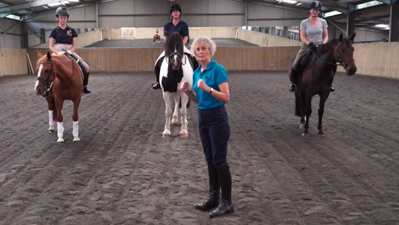TOP FIVE SKILLS TO IMPROVE YOUR DRESSAGE MARKS
August 5, 2016WHAT EVERYONE SHOULD REMEMBER WHEN TRAINING HORSES
August 5, 2016Taken from the book Master Dressage
Please share this article on with your friends.

SOME DRESSAGE DOS AND DON'TS
DOS:
- Do learn to ride accurately so you don’t make movements more difficult for your horse. This will help keep your horse more balanced and appear more supple (Chapter 4)
- Learn to move fluidly between movements and prepare your horse correctly (Chapter 5)
- Improve your understanding of test requirements, judges comments, correct way of going, scales of training and rider pitfalls (Chapter 6)
- Learn how to practice correctly and improve your focus. Learn how to overcome typical training issues by recognising your own limitations and having alternatives to hand. Think about how you are going to move from home to competition with the least amount of stress (Chapter 7).
- Make a more scientific effort to review your work and make decisions based on the review. Learn different review techniques and how they effect the different levels of training (Chapter 8)
- Work on your riding skills and confidence (Chapter 9,10)
- Put the horse firmly on your side, be his cheer leader, look out for him. (The whole book!)
- Do have patience with yourself and your horse, learning this stuff is even stranger for him than it is for you!
DONT'S:
- Don’t blame the horse! 90% of how well your horse goes is down to you.
- Don’t dismiss comments by judges because the marks or comments don’t suit – “Oh this judge doesn’t like XYZ type horses” – Judges may have preferences, even in dressage, but it would not colour the marks enough. If there is a disparity between what you got and what you think you should have got, look at the chapter on understanding – be prepared to do video review, ask the judge and so on.
- Don’t rush your training to achieve some arbitrarily set goals such as competition dates. In training, have a plan, but be prepared to throw that plan out of the window if something else needs working on.
- Don’t get into protracted struggles with your horse, if you are struggling or fighting with your horse, it ain’t right! It could be that the horse isn’t ready, or you are lacking the skill to make it happen or the horse is compromised in some way and needs a vet, physio, farrier etc etc. Be prepared to accept your lack of skill and choose a ‘fall back point’ from the chapter on Practice.
- Don’t be afraid to ask for help!

HOW DO I LEARN MORE?
If you'd like more helpful training tips for you and your horse, take a look at what Dressage Training TV offers...
There are regular live online webinars to join where you can chat to the coaches about the lessons, if you can't make the live webinar, you can always watch the multiple video courses available to you when ever you want to watch them.
There are regular live online webinars to join where you can chat to the coaches about the lessons, if you can't make the live webinar, you can always watch the multiple video courses available to you when ever you want to watch them.

